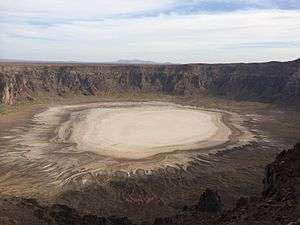Al Wahbah crater

The Al Wahbah crater (Maqla Tamia in Arabic) is a volcanic crater, which is located about 250 kilometres away from Taif, Saudi Arabia, on the western edge of the Harrat Kishb basalt plateau. The Harrat Kishb plateau contains many volcanic cones. It is 250 m (820 ft) deep and 2 km (1.2 mi) in diameter. The bottom of the crater is covered with white sodium phosphate crystals.
Origins
While it was thought for some time that the crater was formed by a meteorite, as its appearance resembles that of the Barringer Crater, with its circular form and high sides, it is now commonly accepted by geologists that the crater is a maar crater, and was formed by volcanic activity in the form of an underground phreatic eruption - a massive steam explosion generated by molten basaltic magma coming into contact with subterranean water.[1]
Vegetation
The remains of date palm plantations can be found halfway down the side of the crater, but they are disused. There are springs near the plantations. It's easy to climb down from the rim to the bottom of the crater there from the North side on a prepared path, although most of the circumference has steep, unclimbable cliffs. At the top of the path is a stone hut which contains rubbish and debris, and some suitable places for camping, although there are better places to camp to the South (see below). In the north of the Wahbah Crater, there is some vegetation located.
Tourism
It takes a person 15–25 minutes to go to the bottom of the crater. This crater is very slippery and it is hard for people to come up to the surface. To climb back up takes approx 20–40 minutes. Furthermore, there is no mobile signal within the crater, and the site receives very few visitors indeed, even over weekends.

References
- ↑ Grainger, David J. (1996). "Al Wahbah volcanic explosion crater, Saudi Arabia". Geology Today. 12 (1): 27–30. doi:10.1046/j.1365-2451.1996.00006.x.
External links
Coordinates: 22°54′0″N 41°8′20″E / 22.90000°N 41.13889°E